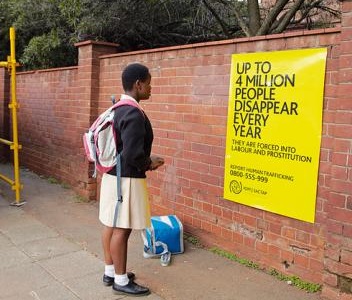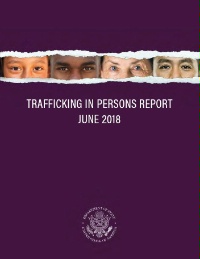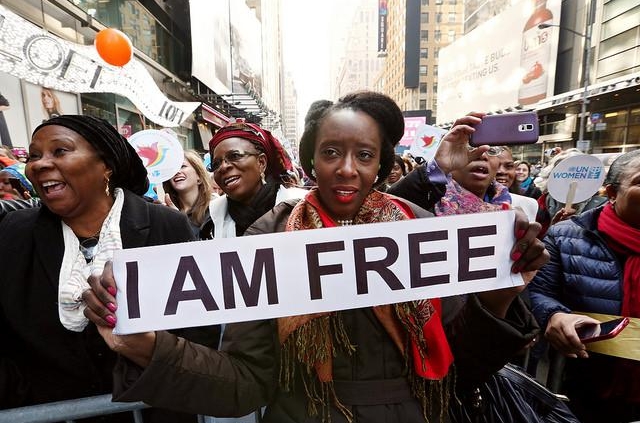Keeping Children Away from Human Traffickers
We asked members to communicate about a crucial issue in their region and what women in media can do.
Patience Wirngo from Cameroon writes: Parents can Deter their Children from Falling Prey to Human Trafficking
Human traffickers often target job seekers in Cameroon willing to migrate for work. They sometimes use force, fraud or coercion to hold victims in conditions of debt servitude or slavery. However, their game plan is usually to promise them decent jobs abroad and then trap victims once they are in a new country, far from the victims’ support networks.
 Due to the hidden nature of human trafficking, the exact scope of the problem is unknown in Cameroon. However, Free Global Slavery Index estimates that more than two hundred thousand (200 000) people are enslaved in the Arabian Gulf countries governed by authoritarian monarchies. Many of the trafficked victims there come from Africa.
Due to the hidden nature of human trafficking, the exact scope of the problem is unknown in Cameroon. However, Free Global Slavery Index estimates that more than two hundred thousand (200 000) people are enslaved in the Arabian Gulf countries governed by authoritarian monarchies. Many of the trafficked victims there come from Africa.
The US Department of State 2018 trafficking in Persons report says more than 500 Cameroonians were repatriated from Libya and Niger in 2017. and that NGOs reported thousands of Cameroonian workers remained in Middle Eastern countries, and that many of these workers were victims of domestic servitude or sex trafficking. (editor note)
Young women from Cameroon have been falling victim to the evil circuit, but a couple of them have been able to escape servitude in Kuwait and came back home to share their stories. Such ordeals are often revealing: of girls transformed to sex slaves and stories illustrating that some of them are victims of forced labour to homes where they are not allowed to feed well, have a decent place to sleep have access to medical care even when they take ill. According to testimonies from some victims who were brought back to Cameroon from Kuwait with the intervention of a Non-Governmental Organization known as Nkumufetfet, most of them are blindfolded before being taken to the homes of their employers. These trafficking agents usually arrange with employers abroad to get young women from Cameroon. To make matters worse they are most often handed no resident permit documents upon arrival at the airport and are not allowed to keep cell phones, thus preventing them from communication with anyone.
Yes, this is the story of those who have succeeded in returning home with the aid of civil society organizations. But what about countless others still trapped back there with no way to communicate with anyone back home to raise an alarm and fight for their liberation? They may just end up dying and/ or being dumped by their cold-blooded employers who treat them worse than animals. The consequence could be that the families of the victims will never hear news of their loved ones or see them ever again.
 The situation has become alarming for Cameroon with current reports that at least 25 girls arrive in the Middle East every day and are sold off like any article to the highest bidder. This is worse than when human trafficking was thought be only an internal issue in the country wherein teenagers and adolescents from economically disadvantaged families used to be lured to hand over their kids to people in urban areas in exchange of services that could better the financial situation of their families.
The situation has become alarming for Cameroon with current reports that at least 25 girls arrive in the Middle East every day and are sold off like any article to the highest bidder. This is worse than when human trafficking was thought be only an internal issue in the country wherein teenagers and adolescents from economically disadvantaged families used to be lured to hand over their kids to people in urban areas in exchange of services that could better the financial situation of their families.
The root cause of the rising figures in trafficking, especially of young girls to countries in the Asian continent, is of course unethical greed and profit, but it is sustained by poverty and ignorance on the part of parents. Many believe that it is a recorded success when their child is abroad and may not find out find out where the child is going to and exactly what kind of job he or she will be doing overseas. abroad.
Social affairs experts say that for things to change, women and mothers need to be sensitized and educated on the dangers their children stand to face when they decide to embark on lucrative jobs overseas or travel abroad by all costs. Such awareness can help parents discourage their children from falling for the temptations of trafficking agents who usually advertise travelling opportunities online or put up posters at street corners in big towns and cities to woo their potential victims. In addition to this, those interested in travelling for greener pastures should also be encouraged or assisted to create jobs for themselves with opportunities in the informal sector back in their home.
These ideas can only get to our targets (girls, young women, women and mothers) by identifying vulnerable populations and targeting awareness campaigns to sensitize them about the dangers of trafficking.
This would be an aim of the current executive bureau of IAWRT Cameroon chapter among other projects, during its two-year mandate. It could help the masses understand the benefits of grooming their offspring to stay and invest in the growth of their economies instead of putting their lives at risk by going to places they know little about.
The campaign could involve associations which are working to prevent human trafficking and the Ministry of Women’s Empowerment and the Family, as well that of Social Affairs to ensure that existing laws are enforced, and measures are taken to punish traffickers and their accomplices.
The mission of the Cameroon chapter of IAWRT will be to use different forms of communications to talk about the social ill until it is drastically scaled down.
Patience Wirngo is the Current secretary of the IAWRT Cameroon Chapter and will be attending the IAWRT regional conference in Uganda in October.
pictures:opendemocracy.org.
Resources








